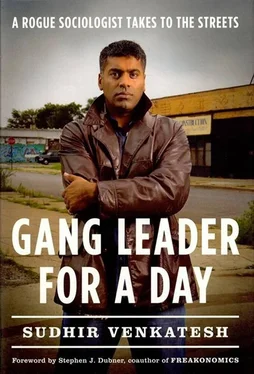When J.T. returned from a trip into the building, everyone straightened up a bit.
“Okay!” he shouted. “They’re ready, let’s go over there.” He ordered a few younger members into the building’s lobby and motioned the others to get into their cars. He looked at me in a funny way. He smiled. I could tell that he was wondering what to say to me. I hoped he was going to invite me along to wherever they were going.
“You got balls,” he said. “I’ll give you that. We have to run. Why don’t you meet me here next week. Early morning, all right?”
This offer took me by surprise. But I certainly wasn’t going to turn him down. J.T. put out his hand, and I shook it. I tried again to think of something witty to say. “Yeah, sure,” I said, “but you’re buying next time.”
He turned and hustled toward his car, a shiny purple Malibu Classic with gold rims. All of a sudden, there was no one left standing around but me.
TWO. First Days on Federal Street
I began spending time with J.T. We’d usually hang out for a little while with some of the more senior members of his gang, and then we’d go for a ride around the South Side.
Although it would take me a few years to learn about J.T.’s life in detail, he did tell me a good bit during our first few weeks together: He had grown up in this neighborhood, then gone to college on an athletic scholarship and found that he loved reading about history and politics. After college he took a job selling office supplies and industrial textiles at a midsize corporation in downtown Chicago. But he felt that his chances of success were limited because he was black; he got angry when he saw white people with lesser skills get promoted ahead of him. Within two years he left the mainstream to return to the projects and the gang life.
J.T. loved to talk about black Chicago as we drove around-the history of the neighborhood, the gangs, the underground economy. Like Old Time and the others who frequented Washington Park, J.T. had his own personal version of history, replete with stories about great gang leaders and dramatic gang wars. He took me to his favorite restaurants, most of which had their own lively histories. One of them, Gladys’s, was a soul-food restaurant where elected community and political leaders used to meet in private. Another marked the spot where two gangs once signed a legendary truce. J.T. always offered to pay for our meals and I, out of appreciation and a student’s budget, always accepted.
J.T. once asked me what sociologists had to say about gangs and inner-city poverty. I told him that some sociologists believed in a “culture of poverty”-that is, poor blacks didn’t work because they didn’t value employment as highly as other ethnic groups did, and they transmitted this attitude across generations.
“So you want me to take pride in the job, and you’re only paying me minimum wage?” J.T. countered. “It don’t sound like you think much about the job yourself.” His tone was more realistic than defensive. In fact, his rejoinder echoed the very criticisms that some sociologists applied to the “culture of poverty” view.
J.T. and I often passed time together at a diner. He might sit quietly, working through the details of his gang’s operations, while I read for my sociology classes. Since he didn’t want to generate tangible evidence of his enterprise, J.T. didn’t write down very much, but he could keep innumerable details straight in his mind: the wages of each one of his two hundred members, the shifts each of them worked, recent spikes in supply or demand, and so on. Occasionally he drifted off, muttering calculations to himself. He didn’t share many details with me, but he did sometimes give me a sort of quiz.
“Okay, I got something for you,” he said one day over breakfast. “Let’s say two guys are offering me a great deal on raw product.” I knew enough to know that “raw product” meant powdered cocaine, which J.T.’s gang cooked up into crack. “One of them says if I pay twenty percent higher than the usual rate, he’ll give me a ten percent discount a year from now, meaning that if the supply goes down, he’ll sell to me before the other niggers he deals with. The other guy says he’ll give me a ten percent discount now if I agree to buy from him at the regular price a year from now. What would you do?”
“This all depends on whether you think the supply will be affected a year from now, right?” I said.
“Right, so…?”
“Well, I don’t have any idea how this market works, so I’m not sure what to do.”
“No, that’s not how you need to think. You always take the sure bet in this game. Nothing can be predicted-not supply, not anything. The nigger who tells you he’s going to have product a year from now is lying. He could be in jail or dead. So take your discount now.”
As fascinating as I found such conversations, I rarely took notes in front of J.T., because I didn’t want to make him cautious about what he said. Instead I waited until I got back to my apartment to write down as much as I could recall.
We often met a few times a week, but only when he wanted. He would phone me to arrange our meetings, sometimes just a few minutes in advance. J.T. didn’t like to talk on the phone. In his soft voice, he’d tell me where and when to meet, and then he’d hang up. Once in a while, I didn’t even have time to answer that I couldn’t meet because I had a class-and then I’d cut class and meet him anyway. It was pretty thrilling to have a gang boss calling me up to go hang out with him. There were times I wanted to tell my professors the real reason I missed class now and then, but I never did.
Occasionally I hinted to J.T. that I would really, really like to learn more about gang life. But I was too meek to ask for any kind of formalizedarrangement. Nor did he offer. Every time he dropped me off in front of my apartment building, he’d just stare out the window. I didn’t know whether to say “Good-bye,” “Hope to see you again,” or “Call me sometime.”
One morning, after I’d been hanging out with him for perhaps eight months, J.T. said we’d be visiting a different housing development, the Robert Taylor Homes. I had heard of Robert Taylor; everybody had heard of Robert Taylor. It was the largest public housing project in the United States, about ten times bigger than the Lake Park projects, with twenty-eight drab high-rise buildings stretched along a two-mile corridor. It lay a few miles away from the U of C, but since it ran alongside the Dan Ryan Expressway, one of Chicago’s main arteries, pretty much everyone in the city drove past Robert Taylor at one time or another.
“I’m going to take you to meet somebody,” J.T. said, “but I don’t want you to open your mouth. Do you think you can do that?”
“Do I ever open my mouth?” I asked.
“No, but every so often you get a little excited, especially after you drink all that coffee. You open your mouth today, and that’s it- we’re through. Okay?”
Only once before had I heard such insistence in J.T.’s voice, and that was the night we first met in the stairwell of Building Number 4040 in the Lake Park projects. I finished my breakfast quickly, and then we jumped into his Malibu. The late-morning sky was overcast. J.T. was quiet except for asking me once in a while to see if any cops were following him. He had never asked this before. For the first time, I became fully conscious of just what I was doing: tagging along with the leader of a major crack-selling gang.
But I still hadn’t admitted to myself that the man I sat next to was, at bottom, a criminal. I was too caught up in the thrill of observing the thug life firsthand. In the halcyon suburb where I grew up, people didn’t even wash their cars on the street. In front of me here was a movie come to life.
Читать дальше












